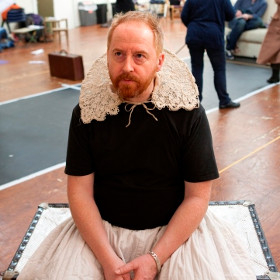Michael Coveney: RSC schools Shrew shares the Almeida’s shifting ground
Michael Coveney attends the RSC’s ‘first encounter’ production of ”The Taming of the Shrew” for schools

© Simon Annand
Julian Fellowes, the actor and writer of Downton Abbey, sparked a furious row last October over the teaching and performance of Shakespeare by stating that the only way to "get" the Bard was through "a very expensive education" such as his own. There might have been a scintilla of truth in this twenty or thirty years ago; but Shakespeare in schools has been transformed by linking it much more directly with performance and practical participation.
The RSC's education department, for instance, had a motto of "stand up for Shakespeare" meaning that the best way of studying our national poet is to speak him, or at least hear him. Countless initiatives on this are underway all over the country, and the latest RSC schools performance, a heavily edited (75-minute) but highly entertaining version of The Taming of the Shrew is justifiably billed as "the perfect introduction to Shakespeare for anyone aged eight and over".
I took that fantastic high speed train from St Pancras to Canterbury (it goes on to Broadstairs and Margate) yesterday to catch Michael Fentiman's production – led by RSC associates Katy Stephens and Forbes Masson – at lunchtime in the fairly new Canterbury Academy on its magnificent campus to the west of the city. The show was a blast and the audience of students aged eight to thirteen fairly raucous. They certainly hadn't been told "how to behave" in a theatre, which was refreshing. "Come, kiss me Kate," was met with several unbidden shouts of "get in there," and indeed "full tongue".
The show's premise, and one totally consistent with the Shakespearean theatre of confused genders and the comedy of disguise, is that there has been a mix-up in the costumes, so that all the men dress as women, the women as men. And each role comes with the costume, so Katy Stephens is a suited Petruchio; Forbes Masson a butch and flinty Katherine; Mimi Ndiweni a determined, almost guilefully feminist Lucentio; Chris Jared – this stopped the sniggers – a stunningly handsome, hairy-chested Bianca; and David Fielder a bearded, fussing old maternal Baptista in full Elizabethan finery.
The effect is a far cry from the all-girl production once presented at Shakespeare's Globe in London, which was a one-way traffic of tomboy tomfoolery and nudge-nudge Sapphic sexuality. Here, the profound truth about the play, the underlying etiquette and preparation for an ideal Elizabethan marriage, the clearing of the ground, and the ground rules, is suddenly revealed in a way I haven't experienced since Jonathan Miller did it for the RSC with Fiona Shaw as Kate.
The most important factor in this is Masson's astonished realisation, from the outset, that he's in fact fallen totally in love with, and in thrall to, Petruchio, however he/she behaves. And on her/his part, Stephens makes it abundantly clear that she is both auditioning "live" for the husband role and, since the recent demise of her father, is in dire need of the dowry.
As a result, the jokes and physical farce of the action unravel in a completely different way. The sibling rivalry of Kate and Bianca is more violently expressed, the younger sister thrashed with a cane and kept in a straitjacket (ie, made a "bondman") in a trunk. And when Stephens turns up for the wedding dressed as Superman with baggy pants, she can claim, with added fervour, "To me she's married, not to my clothes".
The outward trappings signify the assumed social status of the characters, not their beating hearts within. And this applies as truly to Claire Brown's wonderfully spirited Grumio, Caroline Faber's ebullient Hortensio, Anjana Vasan's resourceful Tranio and Ann Penfold's good-natured Gremio (her first "male" role in fifty years an actress). It's a tight and witty production, played out on an unfurled Persian carpet against designer Colin Richmond's brilliantly appropriate barricade of suitcases.
There's no attempt to dilute the lute jokes, either (more surprised raucousness), or the bestiality of the various contracts. There's a little bit of twerking, as well as tweaking, but it was clear from the Q&A afterwards that the students had plugged directly into the play's meaning and vitality; one meek little girl was almost bursting to say that Bianca trussed up in the trunk reminded her of her own fights with big sister at home.
Michael Fentiman is one of the new breed of young directors, designers, composers and technicians in a satellite around Rupert Goold, to some extent; he worked as Goold's assistant at the RSC on the fantastic Romeo and Juliet (Sam Troughton and Mariah Gale) a few years back and made his main house RSC solo directing debut with last year's thrilling Titus Andronicus (Katy Stephens was Tamara, Queen of the Goths) – and he's still only 31! – but he also has a most unusual pedigree of directing on cruise ships, in professional wrestling, and in pantomime, which he writes and directs each year at the Arts In Cambridge.
So although he's highly intelligent, he's not John Barton or Trevor Nunn in the sense that he's breaking that Oxbridge mould of Cambridge and the Marlowe Society that underpins the RSC still. He's from Harlow New Town in Essex and studied at Bretton Hall. It so happens that Fentiman pitched up later yesterday evening at the Almeida for the formal opening of Goold's tenancy as artistic director with the Headlong production of 1984 by two more of the new Gooldy crowd, Robert Icke and Duncan Macmillan. There's definitely a sense of change and shifting centres of creativity in the air, and yesterday was a good chance to test the water.












